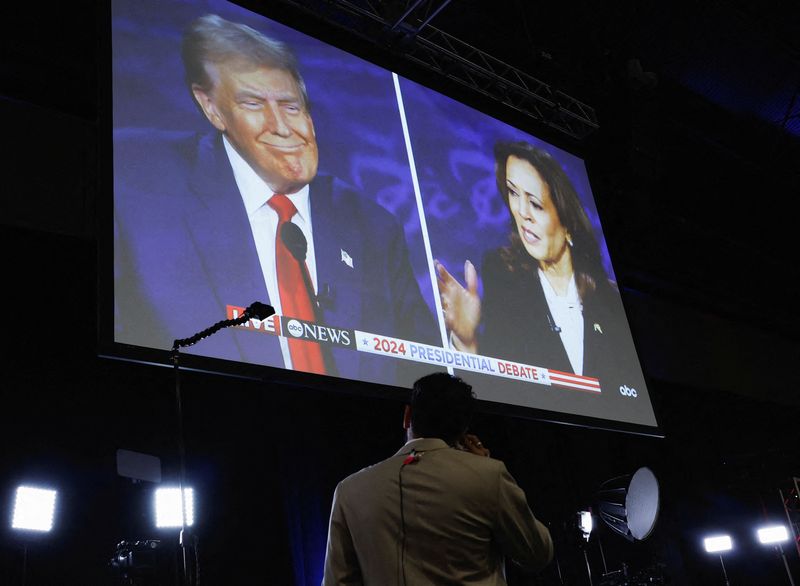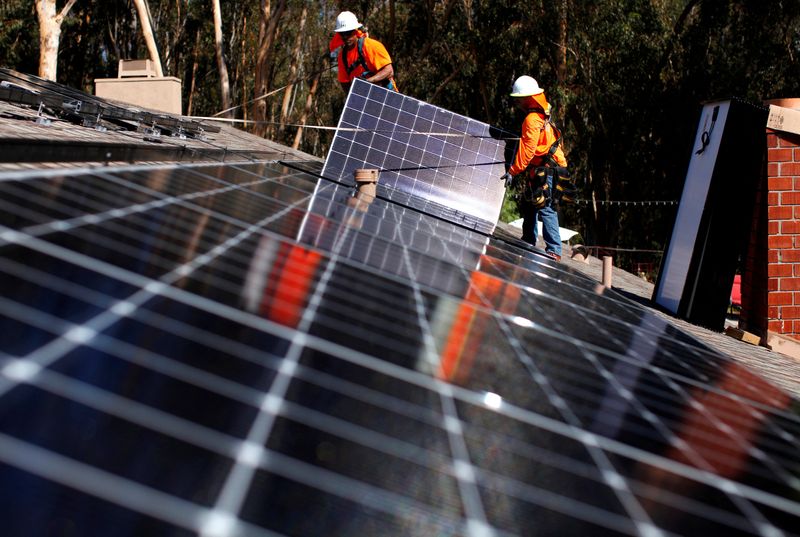By Saqib Iqbal Ahmed, Suzanne McGee and Rae Wee
NEW YORK (Reuters) -Investors scrambled to shift their positioning on Wednesday following a closely-watched debate between Republican Donald Trump and Democratic Vice President Kamala Harris, as betting markets swung in Harris’ favor after the event.
Shares of Trump Media & Technology Group, the company that owns Truth Social, fell 13% on Wednesday afternoon, while other so-called Trump trades such as bitcoin and crypto stocks retreated. Solar stocks, seen as benefiting from a Harris win, rallied and healthcare shares fell.
In a combative debate late Tuesday, Trump and Harris clashed over everything from the economy to immigration, as each sought a campaign-altering moment in what has been a closely-fought race.
Their exchanges left investors with few new details on issues that could sway markets, including tariffs, taxes and regulation. But online prediction markets showed bets on a stronger likelihood of a Harris win in November: Harris’ odds in PredictIt’s 2024 presidential general election market improved to 55 cents from 53 cents before the debate, while Trump’s odds slipped to 47 cents from 52 cents.
There is a “general view that Harris won the debate,” said Alvin Tan, head of Asia FX strategy at RBC (TSX:RY) Capital Markets in Singapore. “It's obviously not a slam dunk for Harris, but the chances of a Trump victory have slipped a bit."
While the presidential race is very much on investors’ minds, political concerns have lately coalesced with more immediate market catalysts, including worries over a potentially softening U.S. economy and uncertainty over how deeply the Fed will need to cut interest rates. The S&P 500 notched its worst weekly percentage loss since March 2023 last week after a second-straight underwhelming jobs report, though the index is still up around 15% this year.
Still, some investors believe even a small shift in perceptions of the candidates could prove significant in a contest that could come down to tens of thousands of votes in a handful of states. The candidates are effectively tied in the seven battleground states likely to decide the election, according to polling averages compiled by the New York Times.
"The US Presidential debate achieved its goal by providing a decisive edge to one of the candidates in what has been an exceptionally close race," said Charu Chanana, Head of FX Strategy and Global Market Strategist at Saxo. "Crypto and energy stocks might face headwinds as market sentiment adjusts to the shifting political dynamics."
Trump has positioned himself as a pro-cryptocurrency candidate.
While it was hard to separate election-fueled moves from macroeconomic-driven action in the dollar, rates and stocks following Wednesday's highly-awaited report on U.S. consumer prices, investors pointed to several corners of the market where the debate appeared to have made an impact.
Investors hammered the shares of Trump Media & Technology Group, which have been popular among retail traders and sensitive to the former president's chances of a win in the 2024 election. The stock fell by as much as 18% to a new post-IPO low of $15.30. Bitcoin was about flat on the day after slipping nearly 4%, while shares of some cryptocurrency-focused companies including crypto miner Riot Platforms (NASDAQ:RIOT) also fell.
Stock of operators of correctional facilities, including GEO Group and CoreCivic, viewed as likely to benefit from tougher immigration policies, also slipped.
At the same time, U.S.-listed shares of solar companies, seen as benefiting from a Harris win, rose. The Invesco Solar ETF, down about 25% for the year, jumped 5% on Wednesday.
Health insurer stocks including Humana (NYSE:HUM) and CVS Health (NYSE:CVS) were also down on Wednesday. Some analysts believe Harris' push to lower drug prices may weigh on the sector.
TAXES AND TARIFFS
Trump has promised lower corporate taxes and a tougher stance on trade and tariffs. He has also said a strong dollar hurts the U.S., though some analysts believe his policies could spur inflation and eventually buoy the currency.
Harris last month outlined plans to raise the corporate tax rate to 28% from 21%, a proposal that some on Wall Street believe could hurt corporate profits.
Steve Chiavarone, senior portfolio manager at Federated Hermes, said a Harris presidency, seen as less likely to widen budget deficits through higher spending, could help support Treasury prices while also boosting large-cap growth and tech stocks.
US-focused policies such as tax cuts and tariffs in a Trump presidency could buoy small cap stocks and cyclical companies while hurting bonds, he said.
On Tuesday night, Harris attacked Trump's intention to impose high tariffs on foreign goods - a proposal she has likened to a sales tax on the middle class - while touting her plan to offer tax benefits to families and small businesses.
The Chinese yuan, which had come under pressure in the U.S.-China trade war during Trump's term, edged up against the dollar on Wednesday.
Trump criticized Harris for the persistent inflation during the Biden administration's term.

However, economic policies could be up in the air for a while longer.
"There wasn’t much substantive discussion of policy," said Sonu Varghese, global macro strategist at Carson Group. "Neither candidate advocated for vastly different economic policies than currently in place. Ultimately, a lot of economic policies that we see implemented next year will depend on the makeup of the Senate and the House."
